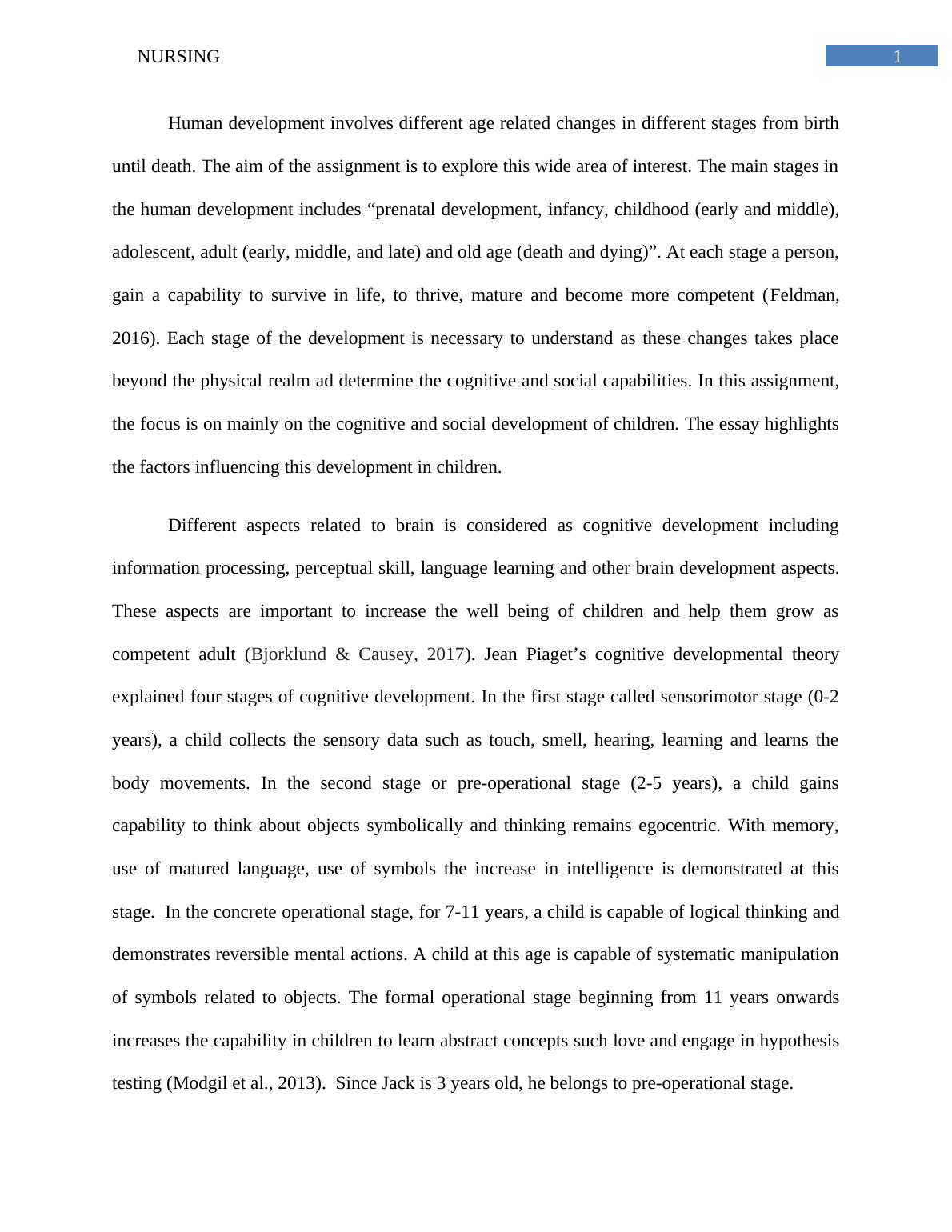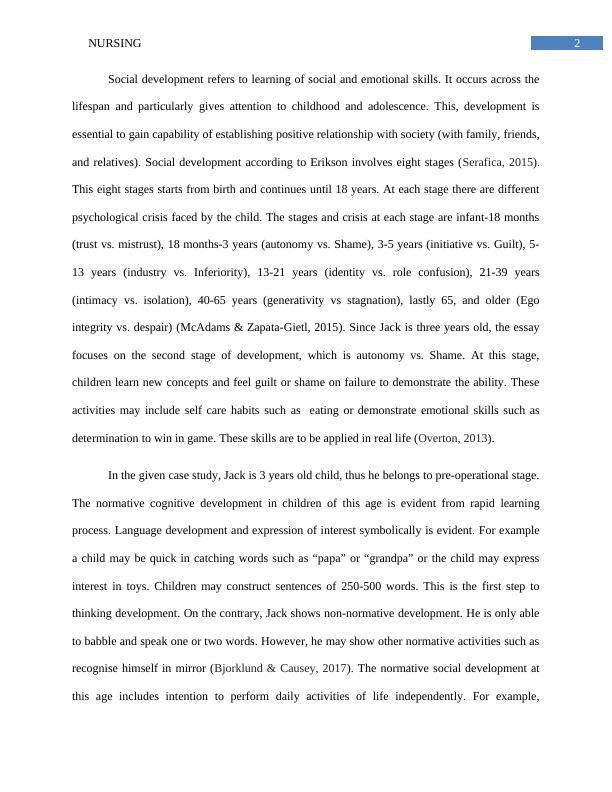Cognitive and Social Development of Children | Report
7 Pages2082 Words67 Views
Added on 2020-04-01
Cognitive and Social Development of Children | Report
Added on 2020-04-01
ShareRelated Documents
Running Head: NURSING
Nursing
Name of the Student
Name of the University
Author Note
Nursing
Name of the Student
Name of the University
Author Note

1NURSING
Human development involves different age related changes in different stages from birth
until death. The aim of the assignment is to explore this wide area of interest. The main stages in
the human development includes “prenatal development, infancy, childhood (early and middle),
adolescent, adult (early, middle, and late) and old age (death and dying)”. At each stage a person,
gain a capability to survive in life, to thrive, mature and become more competent (Feldman,
2016). Each stage of the development is necessary to understand as these changes takes place
beyond the physical realm ad determine the cognitive and social capabilities. In this assignment,
the focus is on mainly on the cognitive and social development of children. The essay highlights
the factors influencing this development in children.
Different aspects related to brain is considered as cognitive development including
information processing, perceptual skill, language learning and other brain development aspects.
These aspects are important to increase the well being of children and help them grow as
competent adult (Bjorklund & Causey, 2017). Jean Piaget’s cognitive developmental theory
explained four stages of cognitive development. In the first stage called sensorimotor stage (0-2
years), a child collects the sensory data such as touch, smell, hearing, learning and learns the
body movements. In the second stage or pre-operational stage (2-5 years), a child gains
capability to think about objects symbolically and thinking remains egocentric. With memory,
use of matured language, use of symbols the increase in intelligence is demonstrated at this
stage. In the concrete operational stage, for 7-11 years, a child is capable of logical thinking and
demonstrates reversible mental actions. A child at this age is capable of systematic manipulation
of symbols related to objects. The formal operational stage beginning from 11 years onwards
increases the capability in children to learn abstract concepts such love and engage in hypothesis
testing (Modgil et al., 2013). Since Jack is 3 years old, he belongs to pre-operational stage.
Human development involves different age related changes in different stages from birth
until death. The aim of the assignment is to explore this wide area of interest. The main stages in
the human development includes “prenatal development, infancy, childhood (early and middle),
adolescent, adult (early, middle, and late) and old age (death and dying)”. At each stage a person,
gain a capability to survive in life, to thrive, mature and become more competent (Feldman,
2016). Each stage of the development is necessary to understand as these changes takes place
beyond the physical realm ad determine the cognitive and social capabilities. In this assignment,
the focus is on mainly on the cognitive and social development of children. The essay highlights
the factors influencing this development in children.
Different aspects related to brain is considered as cognitive development including
information processing, perceptual skill, language learning and other brain development aspects.
These aspects are important to increase the well being of children and help them grow as
competent adult (Bjorklund & Causey, 2017). Jean Piaget’s cognitive developmental theory
explained four stages of cognitive development. In the first stage called sensorimotor stage (0-2
years), a child collects the sensory data such as touch, smell, hearing, learning and learns the
body movements. In the second stage or pre-operational stage (2-5 years), a child gains
capability to think about objects symbolically and thinking remains egocentric. With memory,
use of matured language, use of symbols the increase in intelligence is demonstrated at this
stage. In the concrete operational stage, for 7-11 years, a child is capable of logical thinking and
demonstrates reversible mental actions. A child at this age is capable of systematic manipulation
of symbols related to objects. The formal operational stage beginning from 11 years onwards
increases the capability in children to learn abstract concepts such love and engage in hypothesis
testing (Modgil et al., 2013). Since Jack is 3 years old, he belongs to pre-operational stage.

2NURSING
Social development refers to learning of social and emotional skills. It occurs across the
lifespan and particularly gives attention to childhood and adolescence. This, development is
essential to gain capability of establishing positive relationship with society (with family, friends,
and relatives). Social development according to Erikson involves eight stages (Serafica, 2015).
This eight stages starts from birth and continues until 18 years. At each stage there are different
psychological crisis faced by the child. The stages and crisis at each stage are infant-18 months
(trust vs. mistrust), 18 months-3 years (autonomy vs. Shame), 3-5 years (initiative vs. Guilt), 5-
13 years (industry vs. Inferiority), 13-21 years (identity vs. role confusion), 21-39 years
(intimacy vs. isolation), 40-65 years (generativity vs stagnation), lastly 65, and older (Ego
integrity vs. despair) (McAdams & Zapata-Gietl, 2015). Since Jack is three years old, the essay
focuses on the second stage of development, which is autonomy vs. Shame. At this stage,
children learn new concepts and feel guilt or shame on failure to demonstrate the ability. These
activities may include self care habits such as eating or demonstrate emotional skills such as
determination to win in game. These skills are to be applied in real life (Overton, 2013).
In the given case study, Jack is 3 years old child, thus he belongs to pre-operational stage.
The normative cognitive development in children of this age is evident from rapid learning
process. Language development and expression of interest symbolically is evident. For example
a child may be quick in catching words such as “papa” or “grandpa” or the child may express
interest in toys. Children may construct sentences of 250-500 words. This is the first step to
thinking development. On the contrary, Jack shows non-normative development. He is only able
to babble and speak one or two words. However, he may show other normative activities such as
recognise himself in mirror (Bjorklund & Causey, 2017). The normative social development at
this age includes intention to perform daily activities of life independently. For example,
Social development refers to learning of social and emotional skills. It occurs across the
lifespan and particularly gives attention to childhood and adolescence. This, development is
essential to gain capability of establishing positive relationship with society (with family, friends,
and relatives). Social development according to Erikson involves eight stages (Serafica, 2015).
This eight stages starts from birth and continues until 18 years. At each stage there are different
psychological crisis faced by the child. The stages and crisis at each stage are infant-18 months
(trust vs. mistrust), 18 months-3 years (autonomy vs. Shame), 3-5 years (initiative vs. Guilt), 5-
13 years (industry vs. Inferiority), 13-21 years (identity vs. role confusion), 21-39 years
(intimacy vs. isolation), 40-65 years (generativity vs stagnation), lastly 65, and older (Ego
integrity vs. despair) (McAdams & Zapata-Gietl, 2015). Since Jack is three years old, the essay
focuses on the second stage of development, which is autonomy vs. Shame. At this stage,
children learn new concepts and feel guilt or shame on failure to demonstrate the ability. These
activities may include self care habits such as eating or demonstrate emotional skills such as
determination to win in game. These skills are to be applied in real life (Overton, 2013).
In the given case study, Jack is 3 years old child, thus he belongs to pre-operational stage.
The normative cognitive development in children of this age is evident from rapid learning
process. Language development and expression of interest symbolically is evident. For example
a child may be quick in catching words such as “papa” or “grandpa” or the child may express
interest in toys. Children may construct sentences of 250-500 words. This is the first step to
thinking development. On the contrary, Jack shows non-normative development. He is only able
to babble and speak one or two words. However, he may show other normative activities such as
recognise himself in mirror (Bjorklund & Causey, 2017). The normative social development at
this age includes intention to perform daily activities of life independently. For example,

End of preview
Want to access all the pages? Upload your documents or become a member.
Related Documents
Cognitive and Social Development in Children Assignmentlg...
|8
|1759
|270
Human Development Stages Essaylg...
|9
|2087
|75
The Developmental Stages Across Lifespan | Essay - Deskliblg...
|8
|2084
|188
The Age Related Changes | Assignmentlg...
|6
|1693
|343
S ' N O S K I R E K I R E L A R O M F O S E G A ST T N E M P Olg...
|12
|491
|460
Psychosexual Theory of Freud Assignmentlg...
|4
|728
|16
